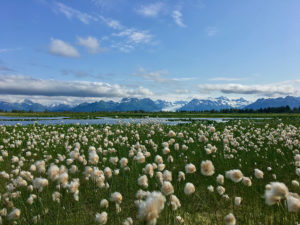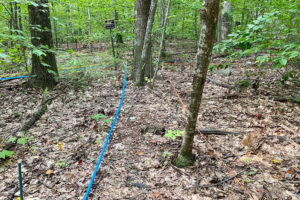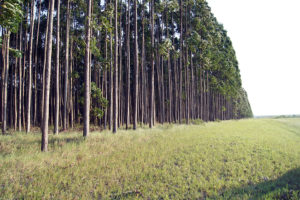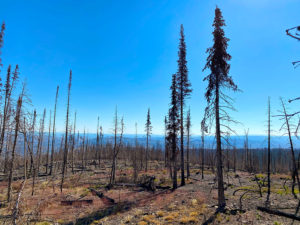Latest portfolio of approved proposals highlight biodiversity and how ecosystems are adapting to stresses.

In their approved proposal, Frederick Colwell of Oregon State University and colleagues are interested in the microbial communities that live on Alaska’s glacially dominated Copper River Delta. They’re looking at how the microbes in these high latitude wetlands, such as the Copper River Delta wetland pond shown here, cycle carbon. (Courtesy of Rick Colwell)
A total of 17 proposals have been approved through the annual Community Science Program (CSP) call of the U.S. Department of Energy (DOE) Joint Genome Institute (JGI), a DOE Office of Science User Facility located at Lawrence Berkeley National Laboratory (Berkeley Lab).
They were selected through peer review from 41 full proposals out of 50 letters of intent submitted.
Many of the proposals focus on harnessing genomics to developing sustainable resources for biofuels and bioproducts. Andrew Nelson of the Boyce Thompson Institute at Cornell University seeks to understand and enhance the rubber biosynthesis pathway in guayale, a drought tolerant shrub. Melissa Roth of the University of California, Berkeley aims to redesign and engineer algae by identifying the algal regulators that could boost lipid production.
Eight of the approved proposals are led by researchers, including Nelson and Roth, who have not been a principal investigator on a previously approved JGI proposal. Among them:

Using plots at the Harvard Forest long-term warming experiment, Kristen DeAngelis of the University of Massachusetts Amherst and colleagues are studying how chronic warming is altering how microbes interact with their environment, potentially accelerating soil carbon loss. Orange ribbons mark the heated plots and blue ribbons mark the control plots. (Mallory Choudoir)
- Ryan Gawryluk at the University of Victoria in Canada is interested in predatory algae known as Rhodelphis.
- Ederson Jesus of Embrapa, Brazil’s public agricultural research corporation, is focused on microbial interactions on the Amazon forest floor.
- Alicia Purcell of Northern Arizona University is studying microbial metabolism in the Antarctic Peninsula.
Additionally, the proposal from Viola Krukenberg at Montana State University successfully evolved from a white paper approved through JGI’s CSP New Investigator call to a full-scale submission. She aims to look at the microbial methane cycle in terrestrial geothermal environments.
 In their approved proposal, Zander Myburg of the University of Pretoria and colleagues aim to unlock the genomic diversity within the eucalypts, a group of fast-growing tree species that are widely grown as feedstocks for lignocellulosic and other biorefinery products. The work builds off a previous international collaboration that produced the reference genome sequence for Eucalyptus grandis. (Courtesy of Zander Myburg) |
The approved proposals start October 1, 2021. The list of approved proposals appears below.
Approved FY2022 Proposals
| Name | Affiliation | Title |
| Bowen, Jennifer | Northeastern University | Microbial controls on carbon cycling and storage resulting from salt water intrusion in tidal fresh, brackish, and saline marshes |
| Colwell, Frederick | Oregon State University | Defining microbial functional capabilities across high-latitude, glacially impacted, wetland landscapes |
| de Vries, Ronald | Westerdijk Fungal Biodiversity Institute (Netherlands) | Mining the unknown part of fungal genomes by combining machine learning with multi-omics and functional characterization |
| DeAngelis, Kristen | University of Massachusetts Amherst | Using genomics to understand microbial adaptation to soil warming |
| Dick, Gregory | University of Michigan | Metagenomic and metatranscriptomic insights into the role of microbial interactions in the cycling of carbon and nutrients during toxic cyanobacterial blooms |
| Gawryluk, Ryan | University of Victoria (Canada) | Adapting ultra-low input long read sequencing methods to predatory algae in a complex culture system |
| Jesus, Ederson | EMBRAPA (Brazil) | Unveiling the functional potential of microbial communities of the Amazon forest floor through metagenomics |
| Krukenberg, Viola | Montana State University | Exploring the microbial methane cycle in terrestrial geothermal environments |
| Mengiste, Tesfaye | Purdue University | Whole genome resequencing of 400 sorghum core subset germplasm collection |
| Myburg, Alexander | University of Pretoria (South Africa) | Eucalypt genomic resources for woody biomass production and carbon drawdown |
| Nelson, Andrew | Boyce Thompson Institute (Cornell University) | Molecular basis of natural rubber biosynthesis in Parthenium argentatum (Guayule) |
| Preston, Jill | University of Vermont | Development of the grass subfamily Pooideae as a powerful comparative genomics model for temperate crop and biofuel development |
| Purcell, Alicia | Northern Arizona University | Quantifying the ecophysiology of growing microbes responding to warming along a productivity gradient of the Marr Ice Piedmont Glacier, West Antarctic Peninsula |
| Read, Betsy | Cal State University San Marcos | The Haptophyte Genome Project |
| Roth, Melissa | UC Berkeley | Deciphering the role of master regulators in carbon flow for enhanced lipid production |
| Vallon, Olivier | Centre National de la Recherche Scientifique (France) | A Chlamydomonas pan-genome |
| Wilkins, Michael | Colorado State University | Impacts of changing wildfire regimes on soil microbiome succession and function |
